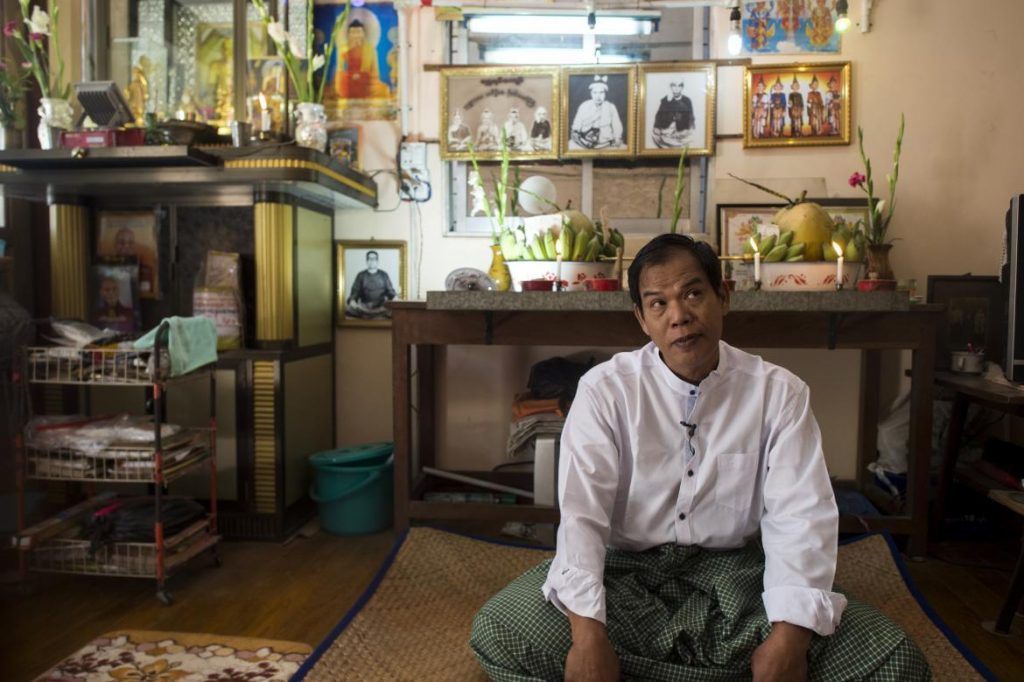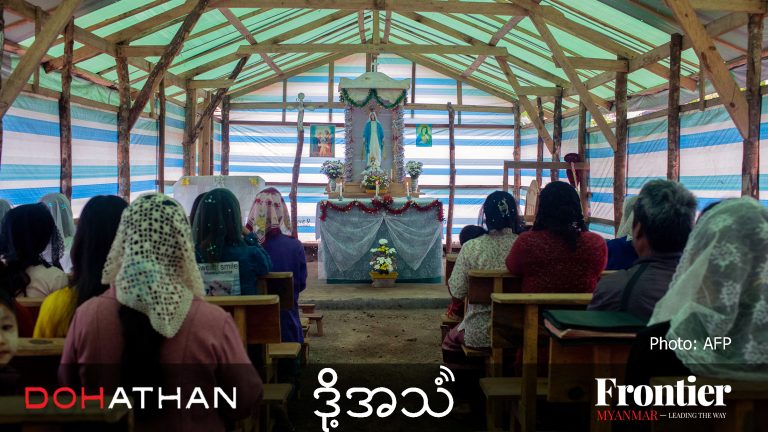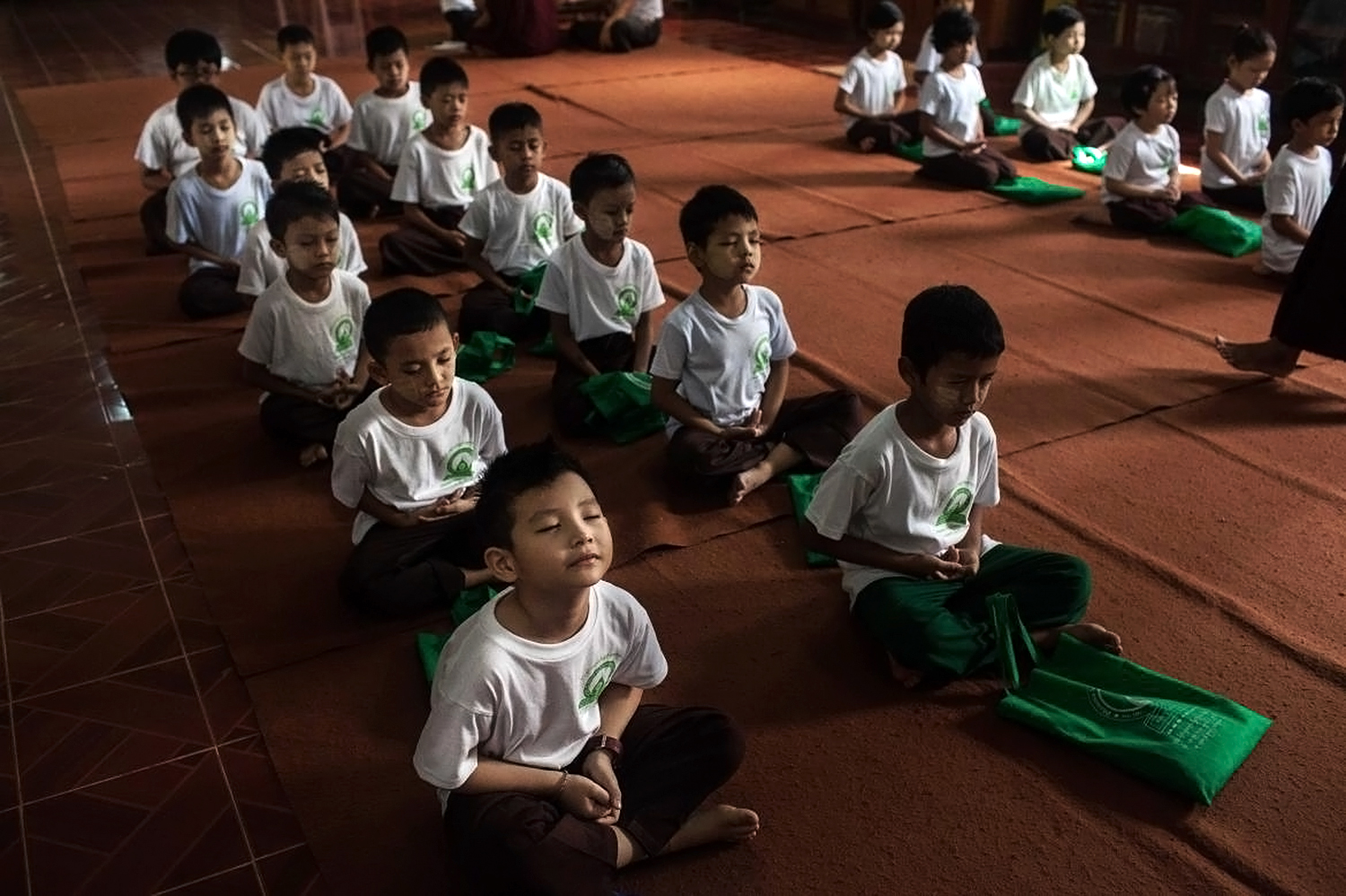By ATHENS ZAW ZAW | AFP
THANLYIN, Yangon Region — From spells to win back an errant lover to help communing with the spirits, Myanmar’s mediums, soothsayers and wizards dabbling in the occult, are in high demand.
Most people here believe in a brand of Buddhism laced with animism and magic, but since the end of military rule such practices have burst into the open.
Daw Win Win Aye is a part-time medium, who claims she has cured dozens of people of illnesses and curses — with the assistance of benevolent Buddhist spirits.
“I know when they have possessed me,” the 42-year-old tells AFP at her house in Thalyin, shortly after a session, which she conducts for free as a hobby.
Support more independent journalism like this. Sign up to be a Frontier member.
“When I want to say something my mouth can’t form the words, the person who possesses me says what he or she wants,” she explains.
During the British colonial era and the half-century of military rule that followed many people used ‘weikza’ — semi-divine Buddhist wizard-saints — to fight their oppressors.
Most of these sects were disbanded or pushed underground by the generals who seized power in 1962, deeply superstitious themselves they lived in fear of a supernatural strike back.
Former dictator General Ne Win was said to be particularly obsessed with the occult: he reportedly bathed in dolphins’ blood believing it would help him regain his youth.
In the 1980s he almost ruined Myanmar’s economy by changing bank notes to denominations of nine, his lucky number.
But since the 2011 handover of power by the junta, magic is back in the open for ordinary people.
Sorcery courses are popping up across the country, and many so-called experts are sharing their knowledge of witchcraft in journals and online.
“Ever since the Burmese censor board was dissolved (in 2012) there has been an explosion in these kinds of magical manuals,” says Thomas Patton, an expert on Southeast Asian magical practices at Hong Kong’s City University.
“I would argue they are one of, if not the most, widely-read genres in Myanmar,” he adds.
Masters of magic
In an unassuming apartment in northwest Yangon, Ko Linn Nhyo Taryar wraps a straw figurine with black tape and places it in the centre of a circle adorned with magical symbols.
The skinny 21-year-old closes his eyes and mutters incantations to ‘activate’ the doll in readiness for his first class as a magic teacher.
The soft-spoken sorcerer started studying magic aged five, beginning by reading tarot cards then gradually building up an online following on Facebook.
“Magic is the art of receiving the power of nature. Without the power of nature, we can’t do anything,” he explains.
“In magic, it depends if you want to do good things or bad things: if you do a bad thing, it will be black magic. If you do a good thing, then it will be white magic.”
Minutes later more than a dozen students start crowding into the room, eager to learn arts they hope will safeguard their loved ones — and their wallets.
Linn Nhyo Taryar shows them how to create voodoo dolls, draw magical charts and cast spells using rituals involving bananas and incense.
“I want to be able to help and protect my family with magic if something (bad) happens to us,” says student Paing Soe Naung, 25.
May Sandar Kyi, a 49-year-old merchant, adds: “I am very interested in it because others treat me unfairly, like when they don’t give me back (money) they take from me.”
Dark arts
But while magical practices are increasingly tolerated in Myanmar, some still fear the power of the supernatural.
A week after AFP attended the lesson, Linn Nhyo Taryar was arrested after scared social media users told police he was teaching people how to use black magic.
Belief in sorcery can also have tragic consequences.
In October, a self-proclaimed exorcist beat two toddlers and an eight-month-old baby to death in a village outside Yangon after telling their families they were possessed.
Appearing at court the following month the alleged killer, Tun Naing, told reporters he had been taken over by a “dark spirit” at the time.
U Zaw Min, a master from the popular sect of Shwe Yin Kyaw, says only people of “good virtue” should carry out exorcisms.
“We have no right to attack others,” the 50-year-old tells AFP. “If we break this rule, we will be in trouble.”
Still, Patton says many people believe magic was behind the biggest change in Myanmar for a generation: the end of military rule and the election of the National League for Democracy in 2015.
“People always looked to these magical saints or wizards or sorcerers to help them bring peace and democracy,” he says.
“Now that has happened a lot of these people believe that ‘wow, this magic really does work.'”
TOP PHOTO: U Zaw Min, a master from the popular Shwe Yin Kyaw sect, talking during an interview at his house on the outskirts of Yangon. (Ye Aung Thu | AFP)







